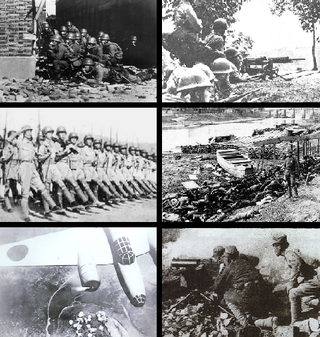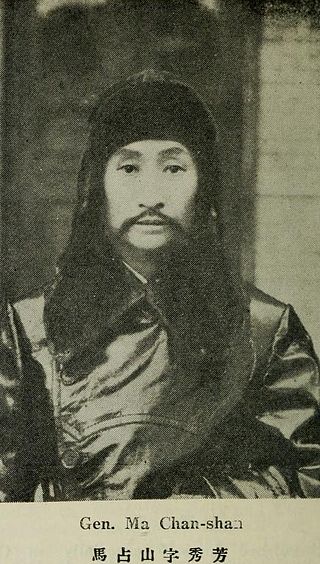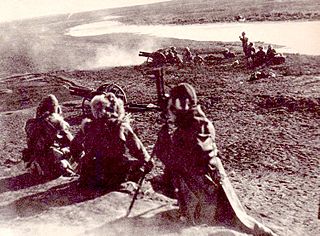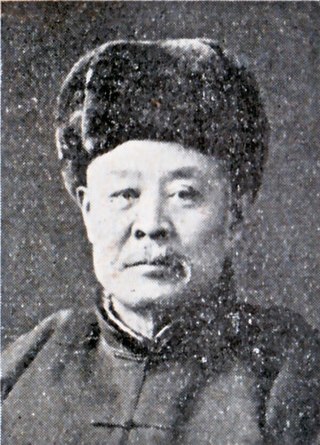
The Second Sino-Japanese War (1937–1945) or War of Resistance was a military conflict that was primarily waged between the Republic of China and the Empire of Japan. The war made up the Chinese theater of the wider Pacific Theater of the Second World War. The beginning of the war is conventionally dated to the Marco Polo Bridge Incident on 7 July 1937, when a dispute between Japanese and Chinese troops in Peking escalated into a full-scale invasion. Some Chinese historians believe that the Japanese invasion of Manchuria on 18 September 1931 marks the start of the war. This full-scale war between the Chinese and the Empire of Japan is often regarded as the beginning of World War II in Asia.

Qiqihar is the second-largest city in the Heilongjiang province of China, in the west central part of the province. The built-up area made up of Longsha, Tiefeng and Jianhua districts had 959,787 inhabitants, while the total population of the prefecture-level city was shrinking to 4,067,489 as of the 2020 census. These are mainly Han Chinese, though the city is also home to thirty-four minorities including Manchus, Daur, and Mongols.

The Resistance at Nenjiang Bridge was a small battle fought between forces of the Chinese National Revolutionary Army against the Imperial Japanese Army and collaborationist forces, after the Mukden Incident during the Invasion of Manchuria in 1931, prior to the start of the Second Sino-Japanese War. It marked the start of the Jiangqiao Campaign.

The Jiangqiao campaign was a series of battles and skirmishes occurring after the Mukden Incident, during the invasion of Manchuria by the Imperial Japanese Army, prior to the Second Sino-Japanese War.

Ma Zhanshan (Ma Chan-shan; simplified Chinese: 马占山; traditional Chinese: 馬占山; pinyin: Mǎ Zhànshān; Wade–Giles: Ma3 Chan4-shan1; November 30, 1885 – November 29, 1950) was a Chinese general who initially opposed the Imperial Japanese Army in the invasion of Manchuria, briefly defected to Manchukuo, and then rebelled and fought against the Japanese in Manchuria and other parts of China.

The Empire of Japan's Kwantung Army invaded Manchuria on 18 September 1931, immediately following the Mukden Incident. At the war's end in February 1932, the Japanese established the puppet state of Manchukuo. Their occupation lasted until the success of the Soviet Union and Mongolia with the Manchurian Strategic Offensive Operation in mid-August 1945, towards the end of the Second World War.
The Defense of Harbin occurred during the early Second Sino-Japanese War, as part of the campaign of the Invasion of Manchuria by forces of the Empire of Japan from 25 January to 4 February 1932.

The Jinzhou Operation or Chinchow Operation was an operation in 1931 during the Japanese invasion of Manchuria, which was a preliminary, contributing factor to the outbreak of the Second Sino-Japanese War in 1937.

The Pacification of Manchukuo was a Japanese counterinsurgency campaign to suppress any armed resistance to the newly established puppet state of Manchukuo from various anti-Japanese volunteer armies in occupied Manchuria and later the Communist Northeast Anti-Japanese United Army. The operations were carried out by the Imperial Japanese Kwantung Army and the collaborationist forces of the Manchukuo government from March 1932 until 1942, and resulted in a Japanese victory.

Su Bingwen, was a Chinese military leader. Graduating from officers school in 1914 he joined the Model Regiment as a platoon leader in 1916, became a company commander, and then battalion commander. He served in the Fujian Army in 1920 as the first Army Brigade Chief of Staff, then the Chief of Staff 13th brigade of the Northeast Army. In 1921 he commanded the 6th Army brigade in the north east, then the 17th Division office in 1927. In 1928, Su became Jiang's chief of staff and deputy commander of the northeastern border National Defense Office Directory. First in 1930 as the military commander of the Eastern Railway garrison then, the Hulun Buir garrison commander in 1931 in charge of the Heilungkiang garrisons of the "Barga District" at the extreme west of Heilungkiang on the Soviet frontier.
After the Japanese invasion of Manchuria, and until 1933, large volunteer armies waged war against Japanese and Manchukuo forces over much of Northeast China.

Feng Zhanhai, or Feng Chan-hai, was one of the leaders of the volunteer armies resisting the Japanese and the puppet state of Manchukuo in northeast China. Feng was born on November 6, 1899. At eighteen he joined the Dongbei Army, and later entered a military school graduating in 1921. After he graduated, he was successively a platoon leader, company commander, and battalion commander. At the time of the Mukden Incident and Japanese invasion of northeast China he was a colonel commanding a regiment of the Kirin Guards Division.

Li Du (Chinese: 李杜; pinyin: Lǐ Dù; Wade–Giles: Li3 Tu4; 1880–1956) was a leading general in the Jilin Self-Defence Army (JSDA). The JSDA was one of the Anti-Japanese volunteer armies led by general Ma Zhanshan which resisted the Empire of Japan's invasion of northeast China in 1932.
Wang Delin or Wang Teh-ling (王德林) (1875-1938) was a bandit, soldier and leader of the National Salvation Army resisting the Japanese pacification of Manchukuo.

The Northeast Anti-Japanese United Army was the main anti-Japanese guerrilla army in Northeast China (Manchuria) after the Japanese invasion of Manchuria in 1931. Its predecessors were various anti-Japanese volunteer armies organized by locals and the Manchuria branches of the Chinese Communist Party (CCP). In February 1936, the CCP, in accordance with the instructions of the Communist International, issued The Declaration of the Unified Organization of Northeast Anti-Japanese United Army and marked the official formation of the organization.
The Jilin Self-Defence Army was an anti-Japanese volunteer army formed to defend local Chinese residents against the Japanese invasion of northeast China. General Ding Chao, Li Du, Feng Zhanhai, Xing Zhanqing, and Zhao Yi organised the Jilin Self-Defence Army in order to prevent the fall and occupation of Harbin city, Jilin province. This brought all their forces under a unified command. Calling for civilians to form volunteer units and join in the defense of the city, the army reached a strength of 30,000 men in six brigades of Zhang Xueliangs Northeastern army.
One of the most successful volunteer armies was the Chinese People's National Salvation Army or NSA, led by a former bandit turned soldier, Wang Delin. At the time of the invasion, Wang Delin's 200 man battalion was stationed near Yanji, a small town in the east of Jilin province. After Wang's troops fired on a party of Japanese surveyors, and Wang refused to submit to the Manchukuo regime, his defiance attracted other resisters to his side. Wang established the NSA on February 8, 1932, numbering over 1,000 men. Within a few months this army became one of the most successful of the volunteer armies. Following news of his victories over Japanese and Manchukuoan forces between February and April, troops who had been reluctant members of the new puppet state's forces deserted and joined the NSA boosting its strength from 4,600 on March 1, to above 10,000 men, possibly as many as 15,000 men, organised in five brigades in April. It is estimated that the NSA had 30,000 volunteers by July 1932.

Northeastern Volunteer Righteous and Brave Fighters was established by Wang Fengge, an officer in the Chinese Northeast Army who involved in the Big Swords Society. After the Japanese invasion of Northeast China in 1931, he raised an anti-Japanese force by linking up with other citizens in the Linjiang and Ji'an areas during late 1931. In March 1932, he announced the establishment of his army – the Northeastern Volunteer Righteous and Brave Fighters.

Zhang Haipeng, was a Chinese Northeastern Army general, who went over to the Japanese during the Invasion of Manchuria and became a general in the Manchukuo Imperial Army of the State of Manchuria.
Li Yanlu, 李延禄, (1895–1985), soldier, communist, and leader of anti-Japanese forces in Manchuria. Li was born in Yenchi, Kirin Province in April 1895. He became involved in the opposition to Yuan Shikai's attempt to restore the monarchy. He joined the Northeastern Army of the Fengtien clique in 1917, as a private soldier and rose to platoon leader then captain over the next sixteen years. Politically, he moved to the left and in July 1931, he joined the Communist Party of China. Three months later, the Japanese began the Mukden Incident and invasion of Manchuria. Avoiding capture and internment by the Japanese, he joined the volunteer army of Wang Delin. There Communists were welcomed and Li and Zhou Baozhong were made high-ranking officers. Li became the chief of staff of Wang's Chinese People's National Salvation Army one of the most successful of the volunteer armies resisting the Japanese and its puppet state of Manchukuo. He was also said to have been secretly organizing communists within the army. Yet Party policy at the time opposed the volunteer armies and the participation of members in them and had their own Northeastern People's Revolutionary Army. At first the Party severely criticised their conduct yet the stance of the Party prevented the growth of their own forces and did not help the anti-Japanese cause.